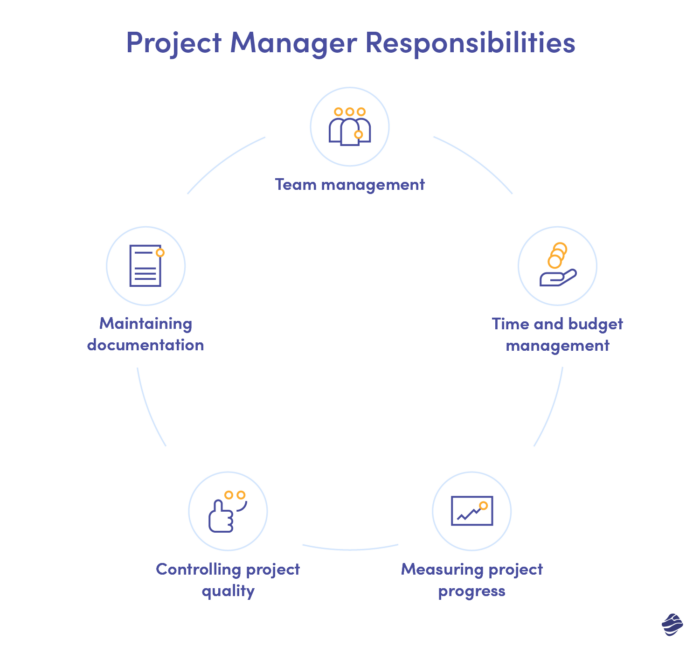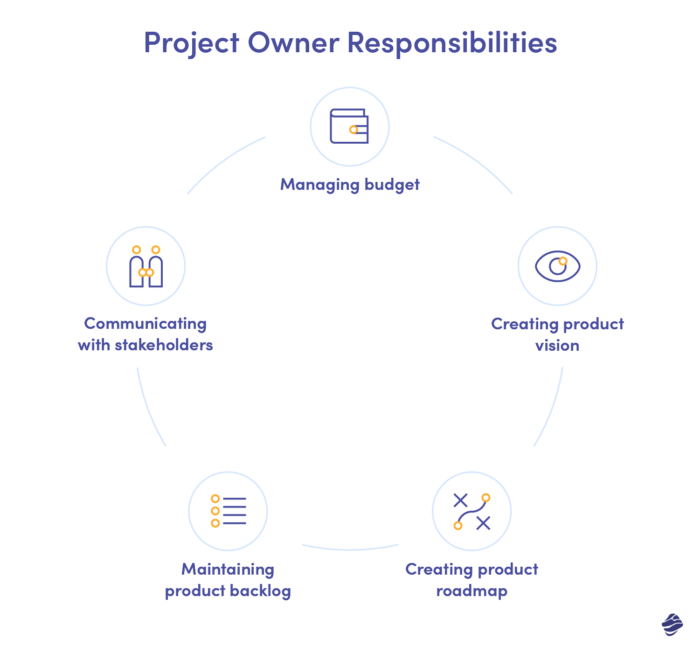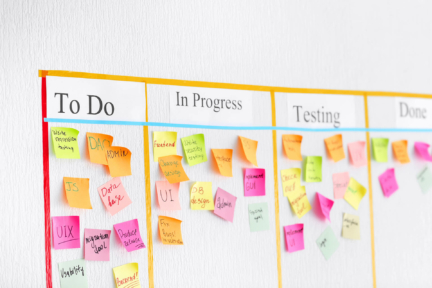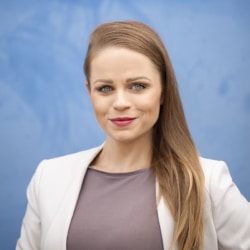Many people, especially those not involved in software projects, tend to think that both the Product Owner and the Project Manager are the same person. They couldn’t be more wrong.
First, let’s get this straight once and for all: the Product Owner is not the Project Manager. What’s more, they play entirely different roles in software development projects. But what exactly do they do on a daily basis? What are their primary responsibilities? To what extent can they influence a project, and how does their work shape the end product?
Today, we come with answers to these pressing questions. Read on to learn all you need to know about the roles and responsibilities of Project Managers and Product Owners in software development projects.
Who is the Project Manager?
Project Management Institute briefly but to the point defines who Project Managers (PMs) are and what role they play:
Project managers are organised, goal-oriented professionals who use passion, creativity, and collaboration to design projects that are destined for success.
Project Managers are bold individuals who shoulder the responsibility of managing projects at each stage – from planning through execution to project closure and delivery. Their role focuses primarily on managing the day-to-day work and acting as a leader for the project team. For that reason, excellent PMs should possess the following skills:
- effective communication with the team and external decision-makers
- leadership and team management
- time and budget management
- problem-solving attitude
- risk management
- technical expertise
And where are Project Managers most needed? In practically any complex long-term project that involves a multi-person team working jointly toward a common goal. So whether you construct a skyscraper, carry out multi-complex digitisation of your organisation, or launch a brand new revolutionary product – in each of these cases, you’ll need a skilled PM that will brilliantly steer the project to success.
As over the past decades, software projects have become far more comprehensive, it should come as no surprise that PMs have made their way to the IT industry as well. And today, virtually every application or piece of software is built under the guidance of a PM who organises the day-to-day work of a development team.
The main responsibilities of Project Managers
Successful Project Manager works a massive burden of responsibility. Their everyday duties mainly include:
- governing the entire software project from start to finish.
- organising work of the development team: preparing timelines as well as choosing tools and project management methodologies (such as Scrum and Kanban).
- managing project risks and seeking to identify and eliminate any potential obstacles that may arise throughout the project.
- continuously tracking and measuring project progress.
- controlling product quality.
- managing project resources, including preparation of project estimates.
- maintaining project documentation, such as project plans, risk management plans, and reports.
- handling the change management process.

What does the Project Manager not do?
Even though quite a big responsibility rests with Project Managers, there are still project elements over which they have no control and which do not fall within their competence. So, what exactly do Project Managers not do in their job?
PMs are not responsible for the following:
- Ensuring that the final product becomes a commercial success and generates high profits.
- Communicating with external stakeholders.
- Approving project budget and deciding where to allocate resources.
- Ensuring that the product responds to user needs and meets their expectations.
Who is the Product Owner?
So, you’ve already learnt about the Project Manager role and what challenges he faces daily. Now, the time has come to bring Product Owners to the spotlight and take a closer look at their job.
As the name clearly implies, a Product Owner (PO) is someone who actually owns the product. I know it’s not rocket science, and you’d probably have guessed it. But here, the word “ownership” is the key to understanding the role of POs in creating advanced digital products.
Product Owner is an irreplaceable role in the Scrum methodology, where POs are responsible for maximising the business value of the product by continuously managing the backlog. For this reason, the person in this position must make many high-level decisions regarding business and product vision. So whether you want to discuss which features should be prioritised or removed from the backlog, where to allocate the budget or when the product should hit the market – always go to the Product Owner as this person will most probably give you the answers right away and, moreover, will have the final say in those matters.
Importantly, in every software development team, there should be only one Product Owner and this role cannot be co-shared. Admittedly, PO can represent external stakeholders and report to them, but Product Owner plays a decisive and individual role in the project.
And what makes a Product Owner suitable for this highly responsible job? First and foremost, well-qualified POs need to:
- Be decisive and take full responsibility for their decisions.
- Have communication skills as POs often are a link between stakeholders and development teams.
- Be able to manage time and resources on a long-term basis.
- Have leadership skills.
- Possess advanced technical knowledge.
- Fully understand the business value of digital products.
The main responsibilities of Product Owners
Product Owners have a wide range of competencies, and their work can influence the project on so many levels. Among their primary responsibilities, we can include the following:
- Setting the direction of product development.
- Creating a long-term product roadmap.
- Taking responsibility for the business success of the product.
- Ensuring product-market fit.
- Communicating with external stakeholders.
- Maintaining the product backlog: prioritising items and updating the backlog.
- Managing budget and allocating resources.
- Together with the Scrum Master, guiding through Scrum and educating the development team about its principles.

What does the Product Owner not do?
As you can see, Product Owners have their hands full. But still, some areas remain outside their remit, and POs don’t have to handle them. And these are:
- Managing the development team and taking responsibility for their performance.
- Creating project plans and maintaining project documentation.
- Choosing the right tools and project management methodologies.
Project Manager vs Product Owner: a detailed comparison
The table below summarises the roles and responsibilities of Product Owners and Project Managers broken down by the most significant categories:
| Project Manager | Product Owner | |
|---|---|---|
| Ownership | Project | End product |
| Main responsibility | Project coordination from start to finish | Requirements definition |
| Planning | Project plan | Product backlog |
| Contact with stakeholders | Virtually no direct contact with stakeholders | Directly contacts and reports to stakeholders |
| Budget management | May prepare budget estimates, however, doesn’t hold responsibility for the budget | Responsible for project management tools, allocating budget and resources |
| End product | No responsibility regarding whether the product meets market needs | Responsibility for business success or failure |
| Relation with development team | Supporting and guiding team throughout the project | Coaching team on Agile principles and processes, helping at the macro level |
| Accountability | Project scope, timeline and task completion | Overall product performance |
The main differences between Project Managers and Product Owners
As you can clearly see, the roles of PM and PO in software development projects differ on many levels. Of all of them, the most important for you to remember are these 3 areas:
- Accountability: While the Product Owner is responsible for the business success of the final product after release, the Project Manager’s role is limited to delivering the project within a given timeline.
- Communication: The PO communicates directly with stakeholders to discuss business decisions with them, the PM in turn, interacts primarily with the development team in the day-to-day work.
- Day-to-day management: The PO manages the product as a whole, ensuring that its final version meets business requirements, whereas the PM focuses on delivering separate tasks.
We have already discussed the fundamental differences between a Project Manager and a Product Owner. Now it’s time to look at what they have in common.
Communication, conflict resolution, and facilitation are the core skills the Product Owner and the Project Manager share. They might have different roles, but they share many essential skills that keep things running smoothly.
One big thing they both do is work hard to finish the project. They’re like the MVPs of the project team. Even though they have different roles, they’re on the same team when it comes to getting things across the finish line.
Furthermore, they both are remarkable at solving problems and helping everyone work together. Project Managers and Product Owners ensure everyone gets along and understands each other.
Lastly, they’re like project superheroes with organization skills. They can juggle many things at once and ensure everything runs smoothly. It’s like they’ve got a secret power that helps them keep everything in order.
Both the Project Manager and Product Owner are like team leaders. They don’t just work alone; they bring different people together and ensure everyone does their part.
The Project Manager and Product Owner create a plan that shows when things should happen and what’s supposed to get done. However, they don’t just show up for the exciting parts; they’re there from the start until everything is finished.
So, when you think about the Project Manager and the Product Owner, think about them as a guide. They’re not just watching from the sidelines but right in the middle, ensuring the project reaches its goal.
Project Manager vs Product Owner: Final thoughts
Both Project Managers and Product Owners play an inherent role in building complex digital products. Even though these two roles cross over, their day-to-day duties and responsibilities differ in many ways. While the Project Manager’s job is to ensure that the project progresses according to the plan, the Product Owner is bound to make more business-related decisions.
And which of these two plays a more significant role in software development projects? There’s no correct answer to that question. And for one simple reason: only by joining forces between the Project Manager and the Product Owner the best possible results can be achieved.
Looking for a reliable bespoke software development company to take managing the software project off your shoulders? Over more than 10 years in business, we have successfully completed over 200 demanding software projects for various industries.
Reach out to us, and let’s make your next software project truly count!






